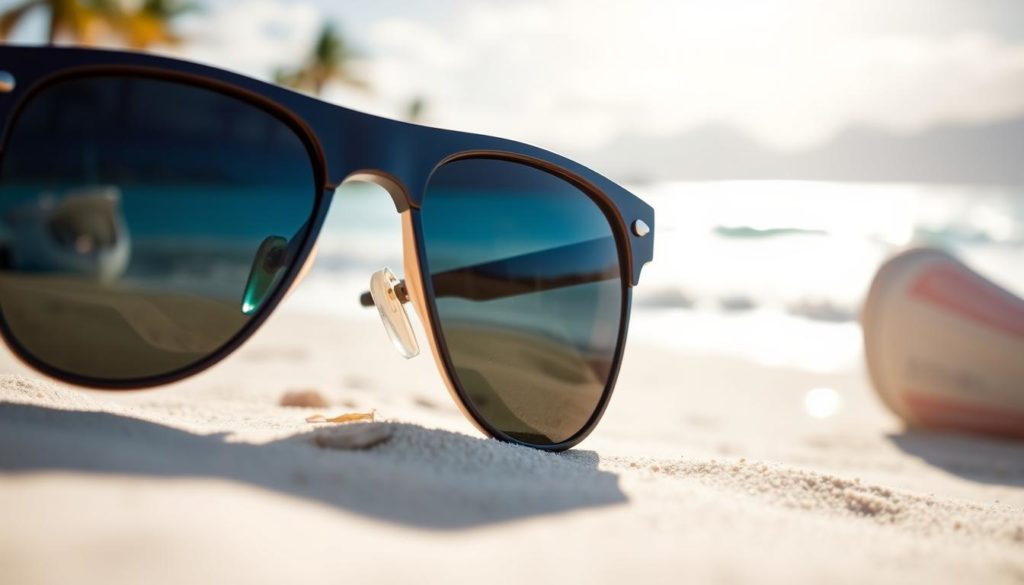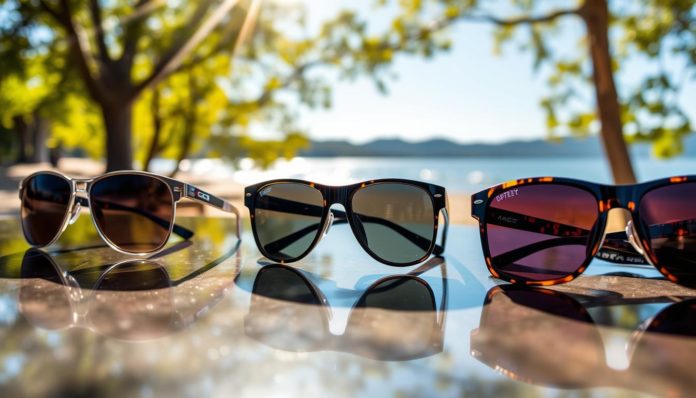Did you know up to 40% of Americans have issues with glare when driving in daylight? This fact shows why the right eyewear matters. Welcome to our guide on polarized glasses. They help reduce common visual problems.
Polarized lenses, also known as anti-glare lenses, improve vision and safety. They cut down glare and eyestrain in bright sunlight. Imagine seeing clearly on a sunny day. You could be driving, skiing, or chilling at the beach.
These lenses work by reducing reflected light and glare. This can prevent frustration or even temporary blindness. Our guide provides Polarized Eyewear Information. It explains how these lenses work and why they’re key for outdoor activities.
What are Polarized Lenses?
Polarized lenses are a type of eyewear made to cut down glare. They’re great for driving and playing sports outside. These lenses have a special coating. This coating blocks horizontal glare from surfaces like water or metal, letting only vertical light through.

Definition and Overview
To grasp the advantages of polarized lenses, you should first know what they are. They’re made to block harsh, reflected light. This boosts both visual clarity and comfort. Thus, they are favored by those who love the outdoors and by drivers.
History and Development
The story of polarized lenses starts in the 1930s. Edwin H. Land, co-founder of Polaroid Corporation, created the first Polaroid filter. This invention was the beginning of modern polarized sunglasses. Over the years, this technology has gotten better. Today, we have efficient lenses that stop glare and are loved by people all over.
Benefits of Polarized Lenses
Polarized lenses have many benefits in bright areas. They are perfect for those who love the outdoors and casual wearers. They improve comfort and protect the eyes.
Reduction of Glare
Polarized lenses cut down glare. This is great for fishing, boating, and beach days. Glare from the water is less of a problem, making seeing easier and more comfortable.
Improved Visual Clarity
These sunglasses make seeing clearer by showing more details. They lessen eye strain for those outside for long hours. Now, viewing everything clearly and comfortably is easier.
Enhanced Depth Perception and Color Contrast
Polarized lenses also improve how we see depth and color. This is super helpful for golfers who need accurate depth judgment. Colors look more vibrant and distinct, which enhances both enjoyment and performance.

UV Protection
They also block harmful UV rays. This protects your eyes from sun damage. It is key for keeping your eyes healthy and ensuring comfort in sunlight.
| Benefits | Description |
|---|---|
| Reduction of Glare | Minimizes glare from reflective surfaces, improving comfort. |
| Improved Visual Clarity | Enhances detail visibility and reduces eye fatigue. |
| Enhanced Depth Perception and Color Contrast | Boosts depth perception and color distinction, aiding activities. |
| UV Protection | Protects eyes from harmful ultraviolet rays. |
How Polarized Lenses Work
Polarized lenses change how we see the world by making things clearer and cutting down glare. They use a special method called polarization. This compares polarized lenses with regular ones.
The Science Behind Polarization
Polarized lenses use a unique filter. This filter blocks light that goes horizontally and causes glare. Light that goes vertically can still pass through.
By aligning chemicals on the lenses, this special function is possible. It cuts down glare from water, roads, and glass. This makes your eyes less tired and improves how well you can see.
Comparison with Non-Polarized Lenses
Non-polarized lenses don’t filter light the same way. They just make everything dimmer. This does not help with glare and can make seeing clearly harder in bright light. Here’s how they differ:
| Feature | Polarized Lenses | Non-Polarized Lenses |
|---|---|---|
| Glare Reduction | Significant | None |
| Visual Clarity | Enhanced | Reduced |
| Eye Strain | Minimized | Potentially Increased |
By comparing them, we see why knowing how polarized lenses work is key. They are vital for the best visual comfort and safety. This is especially true for driving, fishing, or other outdoor fun.
Common Applications of Polarized Lenses
Polarized lenses are incredibly useful for many activities, giving great benefits. They are perfect for when you’re driving or doing outdoor sports. These lenses help you see clearly and keep you safe.
Driving
Polarized lenses are a big help for drivers. They cut down on glare from roads and coming cars. This makes driving safer by helping drivers see better and react faster to dangers. With these lenses, driving under the sun is much more comfortable.
Water Sports
For fishing, boating, and other water activities, polarized lenses are key. They get rid of water surface glare so you can see below. This is great for spotting fish and safe navigation. These lenses let you enjoy your sport without visual trouble.
Snow Activities
For skiing and snowboarding, polarized lenses make things safer and more fun. They reduce glare from the snow, improving how well you can see. With these lenses, it’s easier to see the terrain, lowering accident risks.
Outdoor Work and Activities
People working or playing outdoors get a lot from polarized lenses. They lessen glare from the sun and shiny surfaces. This makes it easier to focus and stay safe. With these lenses, doing tasks well and comfortably is easier.
| Activity | Benefit | Technology Impact |
|---|---|---|
| Driving | Reduces glare from roads and vehicles | Enhanced safety and comfort |
| Water Sports | Improves visibility below water surface | Better performance and enjoyment |
| Snow Activities | Minimizes glare off snow | Improved terrain visibility and safety |
| Outdoor Work and Activities | Reduces glare from sunlight and surfaces | Enhanced focus and efficiency |
Polarized Lenses vs. Photochromic Lenses
Understanding the difference between Polarized and Photochromic Lenses is crucial. Polarized lenses block horizontal light to reduce glare. This makes them perfect for driving and outdoor sports. Glare from surfaces can be a big problem, but these lenses help. They improve visual clarity and safety.
Photochromic lenses change with the light, getting darker in the sun and clear indoors. This makes them versatile and convenient. They adjust automatically, which is great for moving between places with different lighting. Plus, they always protect against UV rays.
Both lens types can be made into Prescription Safety Glasses. So, you don’t have to compromise on vision correction. Let’s compare them:
| Feature | Polarized Lenses | Photochromic Lenses |
|---|---|---|
| Primary Function | Reduces glare | Adapts to light conditions |
| Best for | Driving, water sports, snow activities | Everyday wear, frequent light changes |
| UV Protection | Yes | Yes |
| Customizable as Prescription Safety Glasses | Yes | Yes |
The choice between Polarized and Photochromic Lenses depends on your lifestyle and needs. Both types offer clear and protected vision in various settings.
Types of Polarized Lenses
Polarized lenses come in two main types, each designed for different needs. Whether you need vision correction or not, there’s a polarized lens for you. They help improve your sight while cutting down glare and protecting your eyes.
Prescription Polarized Lenses
Prescription polarized lenses help those who need vision correction. They reduce glare and block UV rays. These lenses fit any prescription, blending clarity with comfort.
Non-Prescription Polarized Sunglasses
If you have normal vision, non-prescription polarized sunglasses are ideal. They reduce glare and make bright settings more comfortable. Driving, fishing, or enjoying a sunny day becomes better with these sunglasses.
Both lens types offer clear vision and glare reduction. To learn more about polarized lenses, visit this complete guide to polarized lenses.
Let’s look at the main differences between Prescription Polarized Lenses and Non-Prescription Polarized Sunglasses:
| Features | Prescription Polarized Lenses | Non-Prescription Polarized Sunglasses |
|---|---|---|
| Vision Correction | Yes | No |
| Glare Reduction | Yes | Yes |
| Customization | To prescription | Standard sizes |
| UV Protection | Yes | Yes |
| Ideal For | Those needing vision correction | People with normal vision |
Polarized Lens Technology
Polarized lenses have changed a lot, doing more than just cutting down glare. They use a special polarizing film on the lens. This film is great at blocking horizontal light. It helps a lot in different places, making things look clearer and more comfortable for your eyes, especially when it’s really bright.
Wearing polarized lenses really changes how you see the world on a sunny day or while doing outdoor activities like fishing, boating, or golfing. They block the annoying glare, which lessens eye strain. This helps make everything look sharper and more defined. So, it’s no wonder that polarized lenses are a must-have for anyone who loves the outdoors.
Yet, it’s key to know that UV protection and polarization are not the same thing. Each does something different to keep your eyes safe. To make sure your glasses have Polarized Lens Technology, look for a label that says so. For more info on how polarized lenses help and where to use them, check out this detailed guide. By choosing glasses with this technology, you’re really taking good care of your eyes and improving how well you see.
FAQ
What are polarized lenses?
Polarized lenses help cut down glare from surfaces like water, metal, or snow. They use a special chemical to block light that’s moving horizontally. This makes it easier to see and reduces eye strain.
How do polarized lenses work?
These lenses have a chemical filter that organizes molecules. It blocks certain light waves. Only light moving vertically can get through, which cuts down on glare and makes vision clearer.
What are the benefits of polarized lenses?
They lower glare and make vision clearer. They also improve how well you see colors and depth. Plus, they protect your eyes from UV rays. They’re great for activities outside, like driving or fishing.
How do polarized lenses compare to non-polarized lenses?
Polarized lenses filter glare specifically, offering clearer vision and comfort. Non-polarized lenses just make things less bright without tackling glare directly. This can lead to more strain on the eyes.
Are polarized lenses effective for driving?
Yes, they’re really good for driving. They reduce road glare and the glare from other cars. This makes driving safer and more comfortable.
Why are polarized lenses good for water sports?
They cut down glare from the water’s surface. This helps you see underwater better and reduces strain on your eyes. They’re perfect for water sports.
What makes polarized lenses suitable for snow activities?
They reduce the harsh glare from snow, improving visibility. This lessens eye fatigue when you’re doing snow activities like skiing.
Can polarized lenses protect my eyes from UV rays?
Yes, alongside cutting down glare, they protect your eyes from dangerous UV rays. They enhance clear vision too.
What is the difference between polarized lenses and photochromic lenses?
Polarized lenses block horizontal light to reduce glare. Photochromic lenses change with the light, getting darker in bright sunlight and clear indoors. Both types meet different needs for lighting conditions.
What are the available types of polarized lenses?
You can get them as prescription lenses for vision needs or non-prescription sunglasses. Both types reduce glare and improve comfort for your eyes.
How has polarized lens technology advanced?
The technology has gotten much better, with new features that protect your eyes and improve how you see. They now use a polarizing film to filter out glare more effectively, helping in all kinds of lighting.


